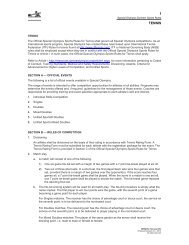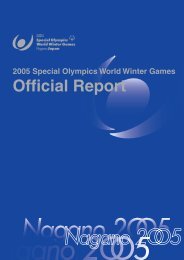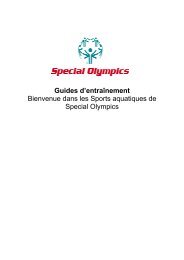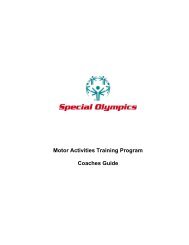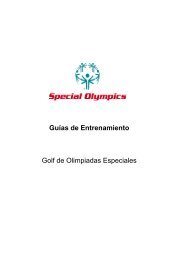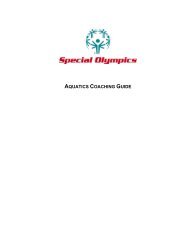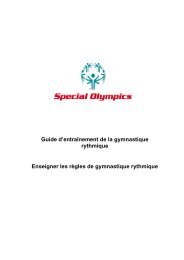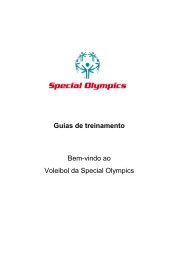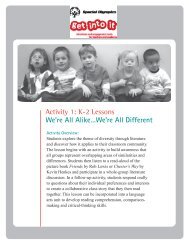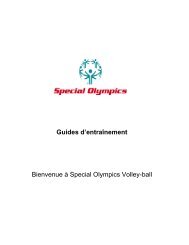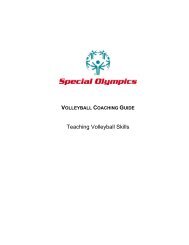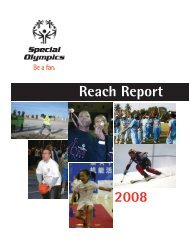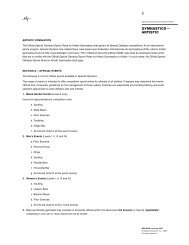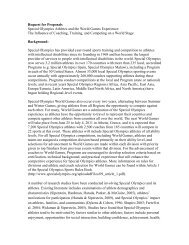BADMINTON Special Olympics Sports Skills Program
BADMINTON Special Olympics Sports Skills Program
BADMINTON Special Olympics Sports Skills Program
Create successful ePaper yourself
Turn your PDF publications into a flip-book with our unique Google optimized e-Paper software.
Recruiting Unified <strong>Sports</strong> Teammates<br />
There are a few basic considerations in selecting appropriate<br />
individuals to serve as teammates on Unified <strong>Sports</strong> teams.<br />
Teammates must first match in age and ability with <strong>Special</strong><br />
O lympics athletes. These individuals must also be willing to<br />
make a commitment to practice as well as to compete.<br />
U n i fied <strong>Sports</strong> is not simply a one-day event where teammates<br />
are matched with <strong>Special</strong> <strong>Olympics</strong> athletes at the competition<br />
s i t e . Furthermore, individuals who would like an organized<br />
sports experience and who are not already participating in<br />
that sport make ideal teammates.<br />
Appropriate teammates can be identified and recruited from<br />
the following sources:<br />
• Community service clubs<br />
• Businesses and corporations<br />
• Church groups<br />
• Students who are involved in organized sports<br />
• Recreation sports enthusiasts<br />
• Siblings.<br />
Careful and thoughtful selection of teammates will lead to<br />
the most positive outcomes for everyone.<br />
Recruiting Assistant Coaches<br />
Knowing a specific sport skill is helpful but not mandatory<br />
in an assistant coach. Family members, teachers, neighbors,<br />
and friends of <strong>Special</strong> <strong>Olympics</strong> athletes can be taught the<br />
basic skill progression and become excellent assistant<br />
coaches. Fr a t e rnal and civic organizations are good sources of<br />
vo l u n t e e r sas well as high school and college student service<br />
clubs or sports teams. Many of your coaches will come from<br />
within the sports community from the following groups:<br />
• Adult competitive club members<br />
• Former competitors<br />
• Parents of children who participate in the sport<br />
competitively<br />
• Professional coaches<br />
• Recreation center employees.<br />
Make sure to plan a minimum of one orientation for those<br />
you recruit. Whenever possible, assistant coaches should also<br />
t a ke the General Session and the Volunteer Coach cert i fi c a t i o n<br />
course before the start of the season. It is also important to<br />
give them a copy of the <strong>Sports</strong> <strong>Skills</strong> <strong>Program</strong> Guide.<br />
<strong>Special</strong> <strong>Olympics</strong> Badminton <strong>Sports</strong> <strong>Skills</strong> <strong>Program</strong><br />
Retaining Athletes and Coaches<br />
D eveloping appropriate, meaningful, and high-quality training<br />
and competition opportunities will increase a progr a m ’s ability<br />
to recruit and retain athletes and coaches. To this end, the<br />
coach-to-athlete ratio has a major impact. It is just as important<br />
to provide one-to-one instruction to athletes with higher<br />
ability as it is to those with lower ability. Use of peer coaches<br />
to provide one-to-one training has been eff e c t ive in improv i n g<br />
skill levels and in fostering inclusion.<br />
H aving several assistant coaches allows the head coach to dist<br />
r i bu t e his or her responsibility and authority. This reduces the<br />
load on the coach, gives each volunteer a very important and<br />
meaningful role, and ensures a long-term commitment by all.<br />
Reports from field organizations indicate that a critical time<br />
in the retention of athletes is the period when they graduate<br />
from school into community work programs. Separation from<br />
friends and familiar programs often comes with transition.<br />
A coordinated effort among the <strong>Special</strong> <strong>Olympics</strong> <strong>Program</strong>,<br />
fa m i ly, and school is important to ensure that <strong>Special</strong> Oly m p i c s<br />
is a part of the athlete’s transition plan. In that way, athletes<br />
can make an appropriate and timely transition into communitybased<br />
sports programs as well as continue a meaningful part<br />
of their life.<br />
1 7



